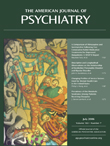To the Editor: Using two epidemiological surveys, Wendy S. Slutske, Ph.D.
(1) conducted important investigations on the persistence and chronicity of pathological gambling. Dr. Slutske found that one-third of the pathological gamblers made a “natural recovery” (p. 300), as indicated by the absence of symptoms in the previous year without treatment-seeking for their gambling problems. Dr. Slutske concluded that pathological gambling may not be as chronic and persistent as commonly believed, and results from epidemiological surveys “may eventually overturn the established wisdom about pathological gambling disorder” (p. 301). Further discussion of the findings is necessary.
Using the National Epidemiologic Survey on Alcohol and Related Conditions data, the same data used by Dr. Slutske, a separate study by Petry and colleagues found that pathological gambling was highly comorbid with other mental disorders, including alcohol use and mood disorders
(2) . It is therefore likely that individuals with pathological gambling disorder may seek help for alcohol use or mood disorders and not seek help specifically for their gambling problems. In addition, it is highly plausible that seeking services for alcohol use or mood disorders may improve gambling problems.
We conducted an additional analysis using the National Epidemiologic Survey on Alcohol and Related Conditions data to investigate treatment-seeking for alcohol and mood problems among pathological gamblers. Individuals were asked if they had ever sought help 1) for alcohol problems or 2) to improve mood. When considering treatment-seeking for conditions found to be highly comorbid with pathological gambling, a “natural recovery” among pathological gamblers was reduced by approximately one-half, from 34% in the study by Dr. Slutske, to 18% in the current National Epidemiologic Survey on Alcohol and Related Conditions-based analysis.
Although some pathological gamblers are able to overcome their gambling problems, it is important to emphasize that the majority of individuals with a lifetime diagnosis of pathological gambling continue to experience some level of gambling-related problems in the past year. Interestingly, the prognosis of pathological gambling as indicated by Dr. Slutske’s investigation is almost identical to the natural course of other mental disorders such as major depression, with approximately 40% continuing to meet DSM criteria for a diagnosis, 20% meeting subthreshold criteria, and 40% experiencing no symptoms
(3) . Dr. Slutske’s analytical approach found that 40% of pathological gamblers continued to meet criteria, 22% had subdiagnostic symptoms, and 38% had no symptoms. Therefore, using this criterion to conclude that pathological gambling may not be a chronic disorder would have the same implications for major depression, which is well recognized as being a chronic disorder.
Finally, it must be mentioned that Dr. Slutske’s study relied on retrospective data to assess the onset and offset of pathological gambling. Firm conclusions regarding chronicity and persistence will ultimately require the use of longitudinal prospective data.
We hope that our commentary and additional analysis contribute to the important ongoing discussion of pathological gambling initiated by Dr. Slutske.

